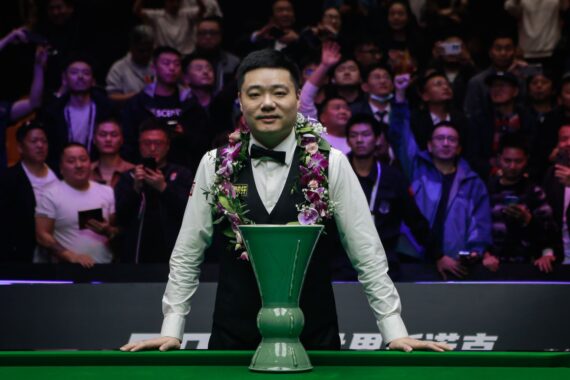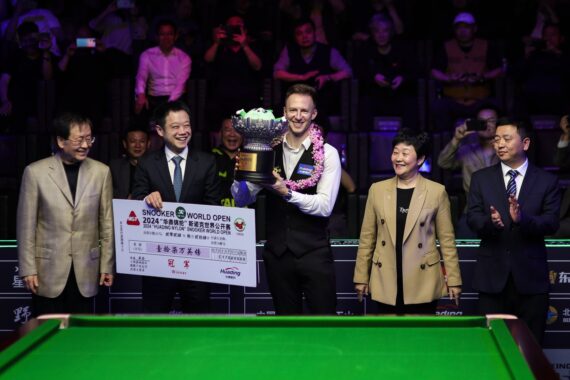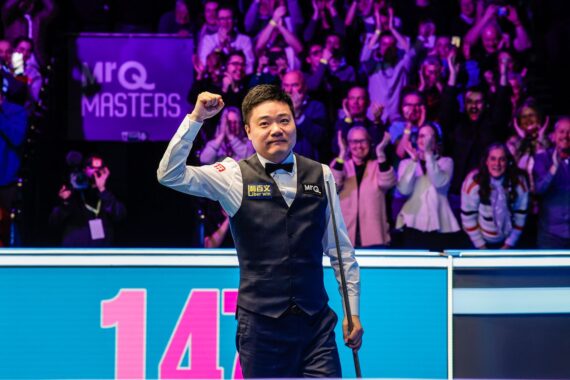Ding To Become Asia’s First Number One
Following the conclusion of the Coral UK Championship on Sunday evening, China’s Ding Junhui is now guaranteed to rise to number one in snooker’s official world rankings for the first time in his career when the rankings list is revised on Monday.
Although Ding could not progress beyond the last 32 stage of the event in York, Neil Robertson’s defeat to Graeme Dott on Wednesday evening confirmed that Ding’s results have been strong enough to see him leapfrog both Robertson and current number one Mark Selby, to claim top spot.
Given Ding’s early exit in York and slower start to the 2014/15 season generally when compared to his 2013/14 campaign, how is it that he has been able to claim top spot at this time? Why not last season when he was winning multiple ranking titles?
The answer is because the world rankings are based upon a two-year system, including all prize money earned during events staged during the previous 24 months. Once events fall outside of that two-year period, the money earned from them will no longer count towards a players ranking.
Only now therefore, following the removal of the £125,000 earned by Mark Selby when he won the UK Championship back in 2012, will Ding have earned more money than the Leicester man.
Another interesting point is that while Ding was able to win five full ranking events last season, to Ding’s one, in pure prize money terms, Selby actually earned £519,216, compared to £492,600 by Ding.
Strangely enough, Selby has also earned more money so far during the 2014/15 season than Ding, but crucially it is the timing of the ‘drop-off’ of prize money that has worked in Ding’s favour at this point.
Regardless of the mathematics, few will argue that Ding does not deserve to be number one and it is a significant milestone for him, as he will become not only the 11th player overall to have taken top spot since the introduction of world rankings in 1976, but the first from Asia.
The first man to hold the official top ranking was Welsh legend Ray Reardon, who remained at number one for six of the first seven seasons, interrupted only by Canada’s Cliff Thorburn in 1981/1982.
For the next 15 seasons, the rankings were to be dominated by another two men, as first Steve Davis held the top spot for seven consecutive seasons between 1983 and 1990, before Scotland’s Stephen Hendry went one better by remaining there for eight, until 1998.
From there, both John Higgins and Mark Williams were able to claim top spot for a couple of seasons each following their maiden World Championship triumphs at the Crucible, before Ronnie O’Sullivan rose to number one for the first time in 2002/3.
Snooker’s ‘big four’ of that era would continue to lock out the top ranking until the end of the 2000’s, O’Sullivan adding a further four seasons, Higgins, Williams and overall leader Hendry one, during the 2006/7 season.
In 2010 however, the rankings were to see their biggest overhaul in several seasons, as it was announced that the official ranking list would be updated on a rolling basis after each completed event, instead of once a season after the conclusion of the World Championship.
This has resulted in a more flexible ranking list, which has seen four players become number one in the four years since, in contrast to just seven players during the previous 34 years.
The first of those was Australia’s Neil Robertson, who enjoyed 77 days at top spot following his victories at the 2010 World Championship and World Open tournaments.
He was followed in 2011 by Mark Selby and Judd Trump, while during that last 18 months the number one ranking has been shared between Selby and Robertson.
Now though it is Ding’s turn to occupy top spot, as a reward for his success during the past two seasons, but how long can he remain there?
With Ding just a little over £2,000 ahead of Robertson after the UK Championship and the pair defending a similar amount of prize money during the coming months, much will depend upon their results during upcoming events.
The one to watch though is Mark Selby, who between now and May has approximately £80,000 less to be deducted from his total than Robertson and Ding, who will both see a drop after this season’s China Open, as the pair contested the Beijing final back in 2013.
Time will tell, but the battle between the three shows no signs of abating in 2015…



